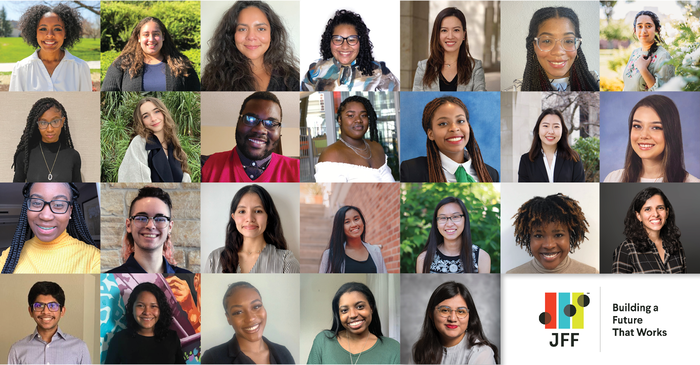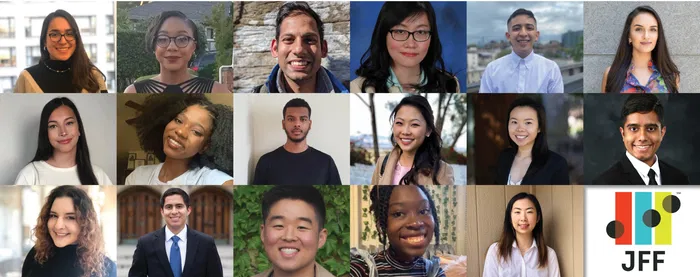When I’m considering future employers, I now have a model for the type of environment I want to work in. What stood out to me is that JFF clearly respects interns, offers us career development and networking opportunities, ensures their program is accessible to a wide range of people, and offers clear and open lines of communication. Several fellow interns I’ve spoken with about this agree, and we think other employers will improve their chances of recruiting members of our generation if they prioritize the needs of young workers the way JFF does.
Respect for Interns
Young people often struggle in their jobs because they feel they’re treated as “irresponsible.” But at JFF, interns are treated with the same level of respect as full-time employees.
I wasn’t just assigned busy-work. My day-to-day tasks included work on mission-critical projects, ranging from proofreading social media posts promoting JFF’s annual summit, Horizons, to copyediting blog posts featured on JFF’s website and a 30-page report for small business owners who want to better support their employees.
By exploring these unique formats, I had the chance to figure out what projects interested me. Alaina Ford, the Knowledge Management intern, acknowledged that experimentation is an essential part of the internship experience and said, “Internships offer opportunities for those entering the workforce to test out different roles, titles, and organizations and see what they do or do not like.”
We’re also invited to staff-wide meetings, where we get the opportunity to experience JFF’s positive workplace culture, which cultivates a safe and welcoming environment for employees of all backgrounds. We even had an all-staff meeting where my fellow interns and I all introduced ourselves to the organization, and everyone welcomed us enthusiastically.
These experiences have met the expectations of intern Mia Elliott, who works in JFF’s Center for Justice & Economic Advancement. “I look for employers who both have a public commitment to diversity and equity and reflect that commitment in their hiring and company culture,” Elliott said. “At JFF, the internship process is open to anyone with a high school diploma, attracting diversity in age and life experience that enriches the workplace.”
Because JFF prioritizes a healthy and inclusive workplace culture, interns have an important role and a voice within the organization. Another intern, Hailey Patel, who works in JFF’s the Center for Racial Economic Equity, shares the sentiment. “Feeling comfortable around coworkers and your organization can play a pretty big role in how well you’re able to work and the quality of your work,” said Patel. “Even though I’m an intern, I’m treated as a regular staff member would be and I’m encouraged to bring all I have to the table and encouraged to bring aspects of my identity into my contributions as well.”
These supports are especially important considering that JFF’s internship cohorts have been comprised mostly of people of color and women of all backgrounds, groups that are underrepresented in paid internships and often do not have access to opportunities to explore career development.
Professional Development
Many employers know that offering all employees opportunities for professional development can improve staff engagement and retention rates. At JFF, that commitment to professional development extends to interns. Throughout the summer, we participated in many activities focused on career growth, including presentations by people at JFF, such as Vice President of Solutions Design and Delivery Nyema Mitchell, Q&A conversations with JFF employees moderated by an intern, and topical professional development meetings, such as a presentation about effective job search practices.
Additionally, interns are assigned mentors who offer advice and support. I was able to meet with my mentor on a weekly basis, and we quickly developed a strong mentor-mentee relationship that allowed me to feel comfortable asking for career advice, such as tips on the best ways to network.
Engaging with professional development experiences is essential for interns and other young people who are in the early stages of their careers.
“When it comes to internships, what I hope to accomplish is getting better at is networking and developing my career, growth within learning more about the company and how it functions, as well as transitioning to a more corporate setting,” said Jerica Frye, the graphic design intern.
Professional Networking
Building a professional network of coworkers, employers, classmates, and others who can provide connections to job opportunities is an essential component of everyone’s career journey. And the JFF internship provided us with opportunities to begin building our networks.
During the first week of the program, Maria Flynn, JFF’s CEO, encouraged us to make at least 50 connections within the organization during our time at JFF. With that advice, I reached out to JFF employees across different teams for coffee chats, and they were more than happy to answer any questions I had about their work. Since I wanted to explore possible career options, I talked with people who previously worked in industries or jobs that I’m interested in and asked them about the comparison between their past experiences and their current role at JFF. These conversations have helped me gain a better understanding of nonprofit work as well as work in other spheres ranging from finance to Asian American activism. Each JFF employee told me that they’d love to stay in contact via email, so I now have a larger professional network I can reach out to in the future.



